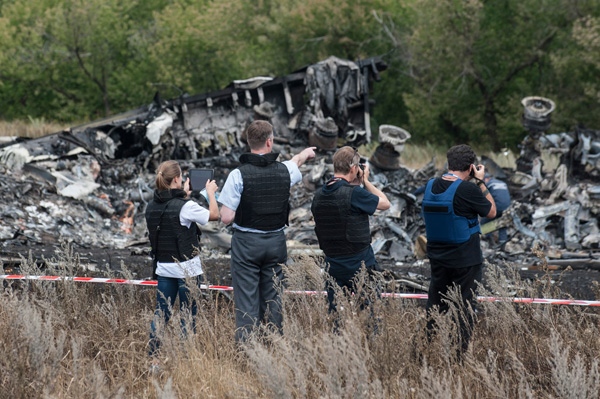
Ukraine: UN political chief says adverse security conditions hampering full access to crash site
“While the cease-fire in south-eastern Ukraine, thus far, is holding, contributing to a marked de-escalation on the ground, the conditions are still not conducive for investigators to have full and unfettered access to the site,” said Under-Secretary General for Political Affairs Jeffrey Feltman.
On 17 July, the Boeing 777 carrying 298 people was en route from Amsterdam to the Malaysian capital, Kuala Lumpur, when it went down in eastern Ukraine, near the Russian border. In the days that followed, the Security Council adopted resolution 2166 (2014) calling for a full, thorough and independent investigation into the incident.
On Friday Feltman briefed the Council on a report released on 9 September by the Dutch Safety Board, which submitted its preliminary findings on the MH-17 accident investigation to the International Civil Aviation Organization (ICAO).
The report contains the first factual findings based on various sources, including the cockpit voice recorder and the flight data recorder, air traffic control data, as well as radar and satellite images.
While last week’s Dutch report is preliminary, it does assert that MH17 broke apart over Ukraine due to penetration by a large number of “high energy objects from outside of the aircraft,” said Feltman.
The report also notes that the aircraft was in “airworthy condition” with no indication that it had any technical or operational issues. The crew was properly licensed and no human error had been reported. The report confirms no distress messages had been received prior to the crash.
Feltman told the Council that the process of identifying further remains is still ongoing. Thus far, 225 bodies have been identified. This is when unobstructed access to the crash site is critical.
“Winter will soon arrive in Ukraine, at which time it will become almost impossible to retrieve further remains and to collect further evidence,” explained Feltman.
“We understand that international investigators will again endeavour to access the crash site, both for repatriation of any further remains and to continue gathering physical evidence toward the completion of the technical report,” he added.
Secretary-General Ban Ki-moon continues to reiterate his call on all those with influence on the situation to exert it immediately to create a “promising security environment” for investigators, he said.
Feltman commended the Netherlands for playing played a pivotal role in leading the investigation. In addition, Australia, France, Germany, Indonesia, Italy, Malaysia, the Russian Federation, Ukraine, the United Kingdom, the United States, as well as ICAO and the European Aviation Agency, have also helped the investigation.
He said that ICAO will continue to provide its full support to the Netherlands, in conjunction with its international team, while we await the conclusions and recommendations eventually will be contained in the Final Report.
On 29 July, ICAO convened a special Task Force on Risks to Civil Aviation arising from Conflict Zones (TF RCZ), which has met twice to-date. The TF RCZ will meet again in December for a next round of talks and will also convene another high-level safety conference with all its 191 member states in February 2015.
“Let us honour the victims and console their families by never letting it happen again,” said Feltman.
Members of the Organization for Security and Cooperation in Europe (OSCE) Special Monitoring Mission to Ukraine examine the MH17 crash site in July 2014. Photo: OSCE/Evgeniy Maloletka
Support Our Journalism
We cannot do without you.. your contribution supports unbiased journalism
IBNS is not driven by any ism- not wokeism, not racism, not skewed secularism, not hyper right-wing or left liberal ideals, nor by any hardline religious beliefs or hyper nationalism. We want to serve you good old objective news, as they are. We do not judge or preach. We let people decide for themselves. We only try to present factual and well-sourced news.







